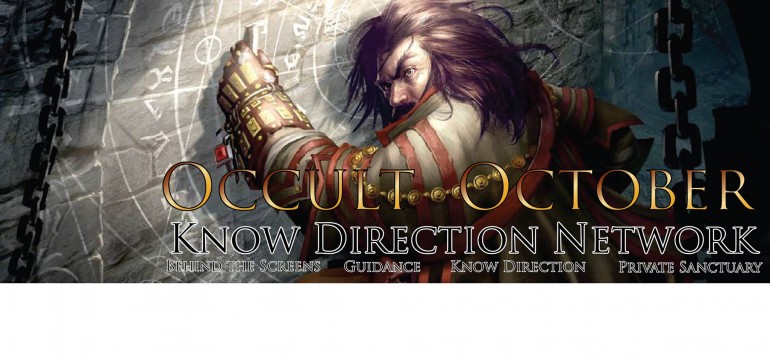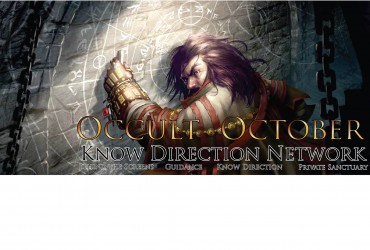Welcome to Guidance, Private Sanctuary’s source for tips and techniques for the Pathfinder Roleplaying Game, written by Everyman Gamer Alexander Augunas. Today, we’re going to be talking about occult character backgrounds.
The character background. Without a doubt, a strong background is one of the most important aspects to creating a character. An effective background explains the character’s history and why he or she has the abilities they currently possess, even if that explanation is simply, “It’s a mystery,” or “she doesn’t understand why.”
In many ways, occult character backgrounds are no different; they should cover the character’s life thus far and should offer potential hooks for roleplaying and adventure. But with that said, occult character backgrounds need a little something extra to be effect. A special spark that clues readers in on just why the character’s background is a little bit stranger than most. Contrary to popular belief, you don’t need to have a character option from Occult Adventures to be an occult character with an occult background, and since Occult October is in full swing, today we’re going to be talking about WHY you might want to have an occult character history, as well as some common tropes that can help your teammates (and other characters in the world) figure out that, yes, something strange is surrounding you.
Let’s get started.
What Makes a Background ‘Occult?’
At its core, the occult is simply the misunderstood or the unknown. It is the weird and strange, the thing that man was not meant to know or dabble in, the thing that keeps children awake at night and animals ill at ease. It is horror, but only in the sense that it is unknown, and the unknown can be scary. For others, the occult represents enlightenment and truth, the greatest mysteries in the world still yearning to be solved. All this, and more, is occult.
So how the heck do we translate that to a character background?
Far from needing to include psychic powers or supernatural beings, an occult background simply needs the following ingredients: mystery, prodding, and weirdness. Let’s go over these elements quickly.
- Mystery: Questions need to exist, both for the reader and the character, for an occult background to exist. At its core, the occult is about exploring the unknown, after all, and if there’s nothing in the background to explore then by definition the background cannot be occult.
- Prodding: Whatever occult elements exist in the story cannot be a one-shot; they need to be border-line obsessive for the character(s) involved in the story. For example, saying, “I’m exploring my powers while I’m doing this other thing,” is not occult, while saying, “I’m doing this other thing in order to better understand my powers,” is occult. In essence, the occult thing needs to be center stage in the background.
- Weirdness: A background cannot be occult if everything is perfectly explainable. In Golarion, there is nothing impossible to explain about a dragon raizing a village. There is, however, something weird and otherworldly about a skull of a long-dead nun coming to life and telling you how to fend against a demon.
So now that we have those basic requirements out of the way, let’s talk about the basic types of occult background.
Background #1 – Hidden Powers
The most basic kind of occult background is, “I have powers that I don’t understand, but need to understand.” Once the power starts to manifest itself, the character becomes fully invested in trying to gain total command over that power, and its nature ties directly in to some greater mystery that’s going on in the story. Often, the “hidden power,” story is driven by urgency, which in turn fuels the investment in discovering the powers. As a final note, the source of the power needs to be poorly understood, if it is understood at all. Often there are rules and restrictions that the character slowly uncovers.
Here are a few examples of the hidden power background in action:
- Attack on Titan: Eren has the power to turn into a monster; this power comes out of left field and no one can explain how he can do it. People fear him, but at the same time they acknowledge that he might very well be their best hope for survival. On top of this, the powers seemingly tie into the biggest mystery facing the world of Attack on Titan, and exploring the origins of those powers becomes vital to the story’s plot as a result.
- Supernatural: Sam Winchester has psychic powers. As the story progresses, the characters start to learn more about where those powers come from, and ultimately they tie into the ultimate agenda of the Season’s villain. Although the characters don’t actively try to understand those powers, their increasing power and frequency becomes a common theme of the show.
- Animorphs: Although hardly magical, the kids in Animorphs are given the power to shapeshift, and throughout the series they’re forced to learn the hard way about the limits of their newfound abilities. Over time, their abilities put them in the middle of a secret war that is waging across the Galaxy, and they are forced to use their powers to fight “the Zerg.”
Background #2 – Strange Machinations
Another common type of occult artifact involves the presence of old magic, strange and terrible. Its powers corrupt and/or change the character, and she needs to decide what, if anything, to do with the power that she now finds herself with. Often, those powers attract unwanted attention, and she needs to use her occult nature to her advantage while protecting herself from the plots of others.
Here are some examples of strange, occult machinations:
- Yu-Gi-Oh!: Yugi Moto, a scrawny freshman gamer who is constantly bullied by others, solves the Millenium Puzzle, an ancient artifact from ancient Egypt. Solving the puzzle frees an ancient, legendary spirit from within the artifact and gives him an alter ego, Yami. Yami possesses dark, shadowy powers and shares Yugi’s fondness for games, and as a result Yami often challenges wicked people who wrong Yugi into deadly games called “Shadow Games.” As the series continues, Yugi’s alter ego begins to attract world-wide attention, which invariably throws him into the center of a centuries-old prophecy with the origins of Yami sitting in the midst of it all.
- Once Piece: Luffy is a pirate who has eaten the fruit of a mystic tree that gives him the ability to stretch his body in impossible ways. Although this power doesn’t play much into the story at the start, eventually Luffy’s desire to become the King of Pirates places him at odds with other individuals with similar occult powers.
- Kingdom Hearts: Sora lives with his friends on a world called Destiny Islands and dreams of living home for adventure. But when an evil force comes to his home and casts everything he knows and loves into darkness, Sora manages to escape when the mysterious Keyblade chooses him as its wielder. Using the Keyblade, Sora has to protect countless other worlds from being swallowed by the darkness while trying to find his missing friends and undo the damage done to his own world.
Background #3 – Close Encounters
The final type of occult background worth mentioning is the close encounters scenario, where the character’s life is forever changed when SOMETHING happens to him. This is different from the weird powers example in that weird people are usually innate; close encounters occultism is the result of something enacting its will upon the character, willingly or unwillingly.
Here are some examples of close encounters:
- Chronicle: The kids from the movie Chronicle get their powers from a strange crystal monster thing, which gives them telekinesis.
- Darkly Dreaming Dexter: Titular Dexter has a presence in his subconscious that he refers to as his “dark passenger,” which is an entity that thrives when he causes pain to others. While it is entirely possible that the Dark Passenger is a metamorph for Dexter’s serial killer mindset, as the series progresses it is portrayed more and more like an actual, physical entity, culminating with Dexter discovering other folks with a simple presence to his within them. Although Dexter never really tries to learn more about his Dark Passenger (where would he go?), it is a key aspect of the story.
And that, as they say, is that! What do you think? What occult backgrounds have you written for your characters? Are there any other background types that you think should have been covered here? What other characters can you think of that fit into the categories that I listed? Can you figure out what Friday’s Iconic Design will be? (Hint, its one of the characters listed above.)
Until next time when Occult October continues, take care!
Alexander “Alex” Augunas has been playing roleplaying games since 2007, which isn’t nearly as long as 90% of his colleagues. Alexander is an active freelancer for the Pathfinder Roleplaying Game and is best known as the author of the Pact Magic Unbound series by Radiance House. Alex is the owner of Everyman Gaming, LLC and is often stylized as the Everyman Gamer in honor of Guidance’s original home. Alex also cohosts the Private Sanctuary Podcast, along with fellow blogger Anthony Li, and you can follow their exploits on Facebook in the 3.5 Private Sanctuary Group, or on Alex’s Twitter, @AlJAug.





